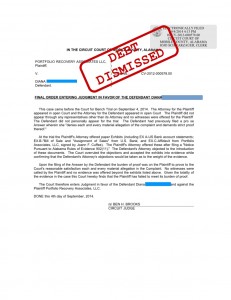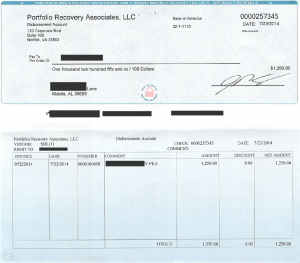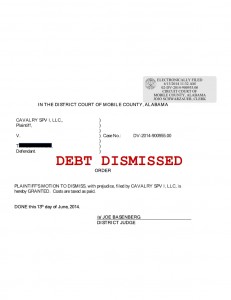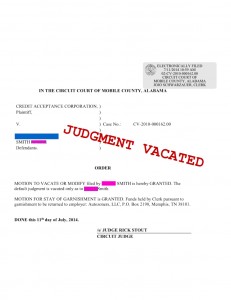Portfolio Recovery Associates Credit Card Lawsuit Defeated – Alabama Collection Defense Lawyer Judson E. Crump

This case represents a trend I’ve noticed among the circuit judges here in Alabama: allowing sketchy debt buyer evidence into the record, but finding in the defendant’s favor anyway.
My client was a good and honest woman who was working hard to claw her way out of debt. She had recently received a promotion at work that boosted her income just above the threshold for garnishment. So when she got served with lawsuit papers from Portfolio Recovery Associates, she was very afraid. Losing 25% of her paycheck to a garnishment would destroy her financially. They were suing her for $6,100, alleging that she owed that balance from a credit card she had once had with U.S. Bank.
She attempted to conduct some basic discovery on her own, and though it did help her delay the trial of the matter, it did not ultimately help her case. The collector didn’t back down and insisted on taking her to trial. Luckily, she hired me in time to analyze her case for all possible defenses. At trial, I objected to their evidence on several grounds, and while the judge considered it a close decision, he ultimately let the evidence be admitted, but took my objections into consideration as to the weight of the evidence. What does that mean? Basically, it means “We agree that the evidence is sketchy, but not so sketchy that we’re going to completely exclude it. Instead, we’ll take a look at it and consider the sketchiness of the evidence as we make a decision.”
This was a bench trial, and experienced judges can do that. I suspect that in a jury trial, where ordinary people cannot realistically be expected to ignore admissibility issues when judging the reliability of a piece of paper they’ve been given, the judge would have sustained my objection.
In the end, the judge found that the evidence just wasn’t strong enough to issue a judgment against my client. While it is a bit more difficult to win like this, it ultimately is better for the consumer because the decision is virtually immune to appeal. Decisions on admissibility are thumbs-up or down decisions that an appellate court can overturn for any good reason. Decisions as to the credibility of witnesses and the finding of facts are the purpose of the trial court, and could only be reversed if the court of appeals found that the trial court’s decision was so wrong that no reasonable person could possibly reach that decision.
Here, the judge made the right decision, and another Alabama consumer was saved from financial ruin by a debt collector.
Debt Collector Pays Mobile, Alabama Woman to Settle FDCPA Lawsuit – Alabama Consumer Credit Attorney Judson E. Crump
Back in October 2013, a Mobile woman came to me with a debt collection lawsuit brought against her by Portfolio Recovery Associates. She was in dire straits and had no way to pay for a lawyer, but she also could not afford to lose 25% of her wages to a garnishment. So I took her case pro bono. I went to the District Court and after I appeared in the case, the collection attorney dismissed the lawsuit. All was well, or so we thought.
Until my client called me saying that she’d received a phone call from Portfolio Recovery Associates seeking to collect on the debt. That’s illegal, so I sued them in federal court on April 10, 2014.
The federal court did not make any findings that PRA had violated the law, and PRA did not admit to violating the law. But they did agree to settle the case by paying my client $1,250 and paying my attorney’s fees separately, so my client got to walk away with $1,250 for her trouble. She really needed the cash, too, because the same week she got her settlement, she got hit by a hit-and-run driver.

A debt collector cannot call you to collect a debt that’s been dismissed in court.
A debt collector cannot ask for money for a debt you’ve already paid or settled.
A debt collector cannot report a paid-off debt to a credit reporting agency as still being owed.
Like the rest of us, debt collectors must obey the law. If they don’t, they must pay. It’s quite simple.
If you’re getting harassed or troubled for debts you’ve settled, paid, beaten in court, or just don’t owe, you CAN do something about it. And it can be worth your time, too. Just ask my client.
Cavalry SPV I, LLC collection lawsuit dismissed – Alabama Collection Defense Lawyer Judson E Crump
One of my clients was sued by Cavalry SPV I, LLC for a Capital One Best Buy credit card. They claimed that he owed about $5,000 and that they were the assignees of the debt. That means that Capital One/Best Buy gave up on trying to collect from him directly, and sold the account to Cavalry SPV I, LLC. Cavalry is a debt buyer, which means that their entire business revolves around purchasing old charged off accounts from creditors who either cannot or will not (because they don’t want their name associated with the negative PR) take legal action on their own.

I entered the case after my client had answered pro se and received a trial date notice. I contacted the opposing counsel about their evidence and we agreed to have the case dismissed with prejudice. This means that the debt, if it ever existed, is gone forever. My client can send that court order to the credit bureaus and demand that they remove the account from his credit report.
$19,000 Default Judgment Vacated – Alabama Collection Defense Attorney Judson E. Crump
If you are not served with the Summons and Complaint in a collection lawsuit, then a default judgment entered against you in that lawsuit is void. That was the point I made to the Mobile County Circuit Court at a hearing on my Motion for Relief from a default judgment on July 11th. My client had apparently been sued by Credit Acceptance Corp. back in 2010. They were unable to serve process (meaning deliver a copy of the lawsuit papers) upon her directly, so they sent a copy by certified mail to the address they had on file for her. The U.S. Postal Service delivered it and someone signed for delivery.
The collection attorneys filed a copy of the signed return receipt with the court and moved for a default judgment. It was granted without opposition. There was one problem, though: my client didn’t live at that address. She had lived there briefly back in 2006, but had long since moved away. So the person who signed for it was not capable of receiving service for her.

She didn’t even know about the judgment until one day out of the blue, her paycheck was missing some of its dollars. She found out that she’d been garnished on a judgment she never knew existed. So she came to me for help. I filed a motion for relief from the judgment. It was granted and now my client will have her chance to defend herself from this suit.
Normally, default judgments are permanent. They are only reversed in specific circumstances, and if the complaint was received by an adult at your address, or someone who is your agent (like a spouse), you’re stuck with it. But when you can show that you’ve never been served with the complaint in the first place, your constitutional right to due process of law provides that you can reverse the default judgment and get your day in court.
Who’s suing you, Part IV: Who is Cavalry SPV I, LLC? – Alabama Consumer Credit Attorney Judson E Crump
Cavalry SPV I, LLC is a fairly standard debt buyer. They purchase old accounts that have been charged off to loss by the original creditor. I have fought Cavalry SPV I, LLC in court before. On August 27, 2013, I tried the case “Cavalry SPV I, LLC v. Andry” in the District Court of Mobile County, Alabama, and won a judgment for the defendant. That lawsuit was brought on an account allegedly owed to CitiFinancial for about $3,000. Now it is gone forever.
I have defeated or dismissed several cases Cavalry SPV I has brought against Alabama citizens since then, so I can assure you: with the right lawyer on your side, you do have a fighting chance!
If you have received a summons from Cavalry SPV I, LLC, be sure to answer the lawsuit. Cavalry SPV I often doesn’t send collection letters or make phone calls before suing you, so some people assume that the summons is bogus or a scam. Whatever else they might be, Cavalry SPV I, LLC is not a scam! If you read my articles, you know that I will tell you if an outfit is a scam or not, and Cavalry SPV I is not. They are a real debt buyer and if you get a summons from them, it is a real lawsuit and if you don’t answer, they will get a default judgment against you and that will enable them to place liens on your property and garnish your wages and bank accounts. Trust me: you don’t want a default judgment against you.
Fortunately, Cavalry SPV I, LLC is not hard to beat in court if you have the right lawyer on your side.
Why I defend People From Credit Card Lawsuits – Alabama Consumer Credit Attorney Judson E Crump
I regularly go to court to fight lawsuits against people who legitimately do owe some money to the people suing them. Is that morally acceptable? Is it ethical for me as an attorney? Yes, because being in financial trouble is not a crime. The people I represent have already tried to pay their bills, but their creditors have chosen to sue them instead of make affordable settlement arrangements. By fighting these suits, I send a message that you should consider working with your delinquent customers before taking them to court. Because if you go to court against a well-defended debtor, you may end up with nothing at all.
Moreover, the banks I fight are all based in big cities far away from my community. I consider it a duty to do what I can to keep as much of the hard-earned money of the people of South Alabama as possible right here. Our local businesses need customers whose wages aren’t being shipped out to Delaware or New York. Everyone wins if the justice system isn’t twisted into some giant collection machine.
How to Answer a Collection Lawsuit in Alabama – Alabama Consumer Credit Attorney Judson E Crump
When you’ve been served with a lawsuit, the most important thing is to take action immediately. Answer it before the deadline. How do you answer? It’s really simple: you just write down your response to the lawsuit on a piece of paper and take it to the clerk of court. They receive it and enter it into their records, and then the Court will read it and depending on what your answer says, either enter a judgment against you or set the case for hearing.
Drafting the Answer.
Most of the time, this is pretty easy. If you disagree with any of the allegations or just want to have your day in court, you can write a “general denial,” which basically says “This is your case: prove it.” A general denial looks like this:
“I deny all material allegations and demand strict proof thereof.”
Federal court cases require more specificity, but luckily 95% of all collection suits are filed in state court, so the Alabama Rules of Civil Procedure govern the process. And under the Alabama Rules of Civil Procedure, you can just enter a general denial and that will set the case for trial.
So even if you don’t think you have a defense, you can file a general denial and that will get your case set for a court hearing. Maybe they’ll give you a good settlement offer. Maybe they won’t show up with any proof. Maybe they won’t show up at all.
Defenses & Counterclaims. If you do have defenses, the answer is the time to present them. In fact, any defense that you don’t put in your answer can be lost forever. So here is where you may need some legal help. Is the debt to old? The statute of limitations may bar the lawsuit. Here are the most common statutes of limitations for collection suits:
Contract (including credit card cases where they have a signed contract): 6 years
Credit Card (if they have proof of written statements mailed to you): 6 years
Credit Card (without a copy of the contract or written billing statements): 3 years
Auto Loan: 4 years
If they do have a copy of the contract, look at the contract for governing jurisdiction. Some contracts may say “this contract is governed by the law of Georgia.” If so, the GA statute of limitations could give you a defense.
Statutes of limitations run from the date of the alleged breach, which typically means the last time you made a payment. If you last made a payment on a car note in March 2010, and they sue you on or after April 2014, then they lose. Period. Even if you owe $500,000, they still lose. Furthermore, a lawsuit filed by a debt collector after the statute has run is a violation of the Fair Debt Collection Practices Act (FDCPA), and you are the one who can go after them for money.
There may be counterclaims as well. Have they violated the Truth in Lending Act? The Fair Debt Collection Practices Act? The Fair Credit Reporting Act? The Alabama DeceptiveTrade Practices Act?
Here is an answer I recently filed for a client where I saw a potential TILA violation:
Answer with TILA Counterclaim in Auto Loan Deficiency Case
Feel free to adapt it to your own ends. It’s public record anyway.
If you think you may have counterclaims against creditors, debt collectors, or mortgage companies who are suing you, then you need to speak with an attorney who can help you. Not a bankruptcy attorney, a real consumer rights attorney who will actually defend you and not just file a bankruptcy and pretend that you have no other rights.
So get out there and fight back! If you have a collection lawsuit story to tell, let me know.